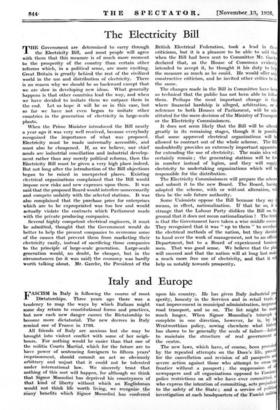The Electricity Bill
THE Government are determined to carry through the Electricity Bill, and most people will agree with them that this measure is of much more moment to the prosperity of the country than certain other reforms which, in a political sense, are more exciting. Great Britain is greatly behind the rest of the civilized world in the use and distribution of electricity. - There is no reason why we should be so backward except that we are slow in developing new ideas. What generally happens is that other countries lead the way, and when we have decided to imitate them we outpace them in the end. Let us hope it will be so in this case, but so far we have not even begun to imitate other countries in the generation of electricity in large-scale plants.
When the Prime Minister introduced the Bill nearly a year ago it was very well received, because everybody recognized the importance of what was proposed. Electricity must be made universally accessible, and must also be cheapened. If, as we believe, our chief needs are industrial conciliation and industrial develop- ment rather than any merely political reforms, then the Electricity Bill must be given a very high place. indeed. But not long after the introduction of the Bill objections began to be raised in unexpected places. Existing electrical organizations complained that the Bill would impose new risks and new expenses upon them. It was said that the proposed Board would interfere unnecessarily and compete unfairly with the selected stations. It was also complained that the purchase price for enterprises which are to be expropriated was too low and would actually violate - the contracts which Parliament made with the private producing companies.
Several highly competent electrical engineers, it must be admitted, thought that the Government would do better to help the present companies to overcome some of the causes that prevent them from marketing their electricity easily, instead of sacrificing those companies to the principle of large-scale generation. Large-scale generation would, no doubt, be cheaper, but in the circumstances (so it was said) the economy was hardly. worth talking about. Mr. Garcke, the President of the British Electrical Federation, took a lead in these criticisms, but it is a pleasure to be able to add tha when the Bill had been sent to Committee Mr. Garde declared that, as the House of Commons evidently intended to accept it, he thought it his duty to help the measure as much as he could. He would offer only constructive criticism, and he invited other Critics to do the same.
The changes made in the Bill in Committee have been so technical that the public has not been able to follow them. Perhaps the most important change is that where financial hardship is alleged, arbitration, or a reference to both Houses of Parliament, will be sub- stituted for the mere decision of the Ministry of Transport or the Electricity Commissioners.
It does not seem likely that the Bill will be altered greatly in its remaining stages, though it is possibl that some approved electrical organizations will allowed to contract out of the whole scheme. The Bill undoubtedly provides an extremely important apparatus for extending the use of electricity. The main idea will certainly remain ; the generating stations will be few in number instead of legion, and they will supply electricity to undertaking organizations which will be responsible for the distribution.
The Electricity Commissioners will prepare the scheme and submit it to the new Board. The Board, having adopted the scheme, with or without alteration, will then be the sole future authority.
Some Unionists oppose the Bill because they say it means, in effect, nationalization. If that be so, it is strange that the Labour Party dislikes the Bill on the ground that it does not mean nationalization ! The truth is that the Government have taken a wise Middle course They recognized that-it was " up to them " to °verbs the electrical methods of the nation, but they decided to hand over the work of management, not to an °Inc' Department, but to a Board of experienced busin men. That was good sense. We believe that the pl will succeed and that the nation will at long last mak a much more free use of electricity, and that it help us notably towards prosperity..














































 Previous page
Previous page